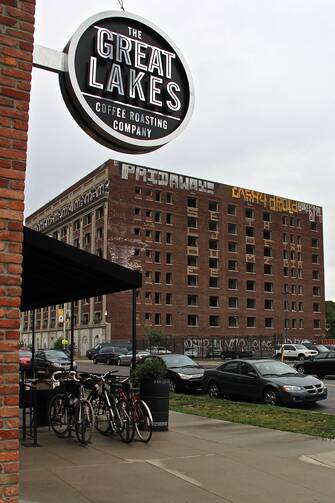Catholic Charities has left the building, in Detroit. At least temporarily. Even as the city of Detroit grapples with the implications of bankruptcy, because of a recent consolidation and reorganization the area’s Catholic Charities services have been going through an upheaval of their own. The Wayne County office of the Catholic Charities elected to go independent, and there is currently no longer a Catholic Charities office in Detroit proper. CEO of Catholic Charities of Southeast Michigan Jason Shanks plans to change that soon. He has been scouting for office space in the city. As the final act of the agency’s regional consolidation, he hopes to open a central office for the new C.C.S.E.M. within city limits by the first quarter 2014.
He thinks it’s important for Catholic Charities to be located within city limits and as a part of the community they are trying to serve. “Detroit is the hub of Southeast Michigan; its more than just symbolic,” he said, “it’s being with people where there is the greatest need, to be with the people and not just reside in the suburbs.
“We need to be there, and Pope Francis is showing the way.”
Shanks sees little chance that the kinds of services Catholic Charities provides will become less necessary any time soon in Detroit. He says regionally food and emergency services have been drastically cut by the federal government after the most recent census. “But the need is still there; poverty is increasing in Detroit.”
Unemployment remains high in Detroit. According to Shanks, 60 percent of Detroit’s children are growing up poor. “From my standpoint, the biggest needs have to do with basic services,” he said: food, shelter, clothing.
Shanks has been going out into the community on a listening tour. He says there is real concern about safety and security among the residents he has spoken to, many of whom live in increasingly isolated pockets of homes as vacant lots and grasslands expand around them. The remaining residents are troubled by overextended city services and the squalor encouraged by abandoned and decaying properties. “It’s difficult to raise a family if you can’t get emergency service in a timely fashion,” he says.
Shanks said Catholic Charities would seek to serve as an advocate for improved services for city residents. Despite the bankruptcy he said, “I find people to be hopeful.” And resilient. “These problems didn’t just arrive overnight; this has been going on a while. The downtown area is revitalizing; now we have to work on the neighborhoods."
He thinks a lot of residents see the bankruptcy as an opportunity to move forward. But “as we go through bankruptcy, we want to make sure that the poor and vulnerable are attended to.” Is he expecting a new client base of city workers who have lost pensions and health care? “We’re going to have and wait and see how that all plays out,” Shanks said. “We stand ready to serve the people of Detroit in whatever way we can.”








